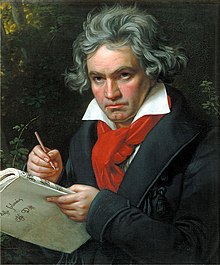Beethoven lost his hearing suddenly when he was 28, an immeasurable blow for any human, but especially grievous for a composer. His loss was made all the worse by the fact that, before he lost it, Beethoven’s excellent hearing was a source of pride, a “sense which I once possessed in the highest perfection,” he exclaimed.
In a letter to his brothers, which was intended to be opened after Beethoven’s death, he expressed, in a frenzied anguish, how isolating his hearing loss was, and how his shame exacerbated this isolation because he felt he couldn’t tell anyone about it.
“Born with a passionate and excitable temperament, keenly susceptible to the pleasures of society, I was yet obliged early in life to isolate myself, and to pass my existence in solitude. If I at any time resolved to surmount all this, oh! how cruelly was I again repelled by the experience, sadder than ever, of my defective hearing! — and yet I found it impossible to say to others: Speak louder; shout! for I am deaf!”
[…]
“Forgive me therefore when you see me withdraw from you with whom I would so gladly mingle. My misfortune is doubly severe from causing me to be misunderstood. No longer can I enjoy recreation in social intercourse, refined conversation, or mutual outpourings of thought. Completely isolated, I only enter society when compelled to do so. I must live like an exile. In company I am assailed by the most painful apprehensions, from the dread of being exposed to the risk of my condition being observed.”
What propelled Beethoven to carry forth when this isolation brought him to “the verge of desperation”?
“Art!,” he writes, “art alone, deterred me. Ah! how could I possibly quit the world before bringing forth all that I felt it was my vocation to produce? … It was Virtue alone which sustained me in my misery; I have to thank her and Art for not having ended my life by suicide.”
In a prescient antidote to his despair, (and advice one wishes Beethoven himself would have heeded), the composer hopes that his letter will serve as a “coming out” about his deafness, and one day bring comfort to those like himself.
“Oh! ye who may one day read this … let any one similarly afflicted be consoled, by finding one like himself, who, in defiance of all the obstacles of Nature, has done all in his power to be included in the ranks of estimable artists and men.”
As a deafish (“moderate binaural sensorineural hearing loss” is the fancy term for it) artist reading this 200 years later, I am immensely consoled by Beethoven’s letter, his struggles, and the knowledge that, after he wrote this, he continued to compose for decades, creating some of his most memorable and life-affirming works, perhaps most notably Ode to Joy, which Beethoven’s biographer Romain Rolland characterized as “the joy of suffering overcome,” and which Helen Keller, deaf and blind herself, described as: “the power of his quenchless spirit by which out of his pain he wrought such joy for others.”
Keller “heard” Ode to Joy in 1924 by placing her hand upon a radio speaker and “feeling … the magnificent symphony which broke like a sea upon the silent shores of his soul and mine.”
The act of writing (and creation in general) is similar to disability in that, each time I sit down to write, I’m faced with my own unending limitations. For all I can’t and never will be able to convey in language.
As Beethoven (and Keller and Frida Kahlo) and countless others remind us, to be an artist is to persist despite our profound losses, our pains, isolations, and shortcomings. To create anyway. To create because we are limited.
The limitation isn’t what stands in our way. It isn’t the obstacle. The limitation is the entire point. It is what ushers us into being, and gives us our most creative advantages.

I love this…thank you.